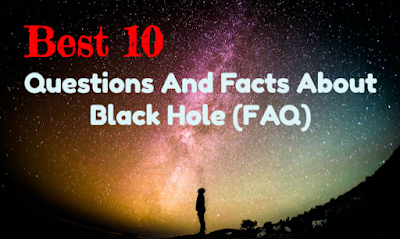In this article, we will discuss the Best 25 Frequently Asked Questions About Black Holes that people ask.
1. What are the 9 planets in real life?
- In our solar system, there used to be nine recognized planets. However, in 2006, Pluto was reclassified as a dwarf planet by the International Astronomical Union (IAU). The eight recognized planets in our solar system are: Mercury, Venus, Earth, Mars, Jupiter, Saturn, Uranus, and Neptune.
2. Are there 8 or 9 planets?
- There are currently eight recognized planets in our solar system. Pluto was reclassified as a dwarf planet in 2006 by the IAU.
3. What is a black hole made of?
- A black hole is not made of conventional matter like planets or stars. It is formed from the remnants of massive stars that have undergone gravitational collapse. The core of a black hole is thought to consist of an incredibly dense and infinitely small point called a singularity, surrounded by an event horizon, which is a boundary beyond which nothing can escape, not even light.
4. What is known as a black hole?
- A black hole is a region in space where the gravitational pull is so strong that nothing, not even light, can escape from it. This results in a region of darkness or "blackness," which is why it is called a black hole.
5. What happens inside a black hole?
- Inside a black hole, the laws of physics as we understand them break down. The gravitational forces become so intense that they warp space and time, leading to the formation of a singularity at the center, where matter is infinitely dense. Anything that crosses the event horizon of a black hole is thought to be irretrievably pulled into the singularity, which is hidden from external observation.
6. Is a black hole harmful for Earth?
- Black holes in distant parts of the universe are not harmful to Earth. They are incredibly far away, and the gravitational effects of even the closest known black holes are not a threat to our planet.
7. Who discovered a black hole in India?
- Indian astrophysicist C.V. Raman made significant contributions to the understanding of light and its interactions with matter, but the discovery of black holes as astrophysical objects is attributed to the work of various scientists worldwide, including Karl Schwarzschild and John Michell.
8. What is a black hole in Indian history?
- Black holes are not typically associated with Indian history or mythology. They are a concept in modern astrophysics and were not known to ancient civilizations.
9. What is the biggest black hole?
- The largest known black holes are called supermassive black holes. The one at the center of our Milky Way galaxy, known as Sagittarius A*, is estimated to have a mass of around 4 million times that of our Sun. However, there are even larger supermassive black holes in other galaxies, with masses billions of times that of the Sun.
10. Can we create a black hole?
- We cannot create black holes with our current technology. To form a black hole, you would need a tremendous amount of mass concentrated into a very small volume, which is not achievable with any known human-made processes.
11. How scary is a black hole?
- Black holes are not "scary" in the traditional sense. They are fascinating and mysterious objects in the universe that follow the laws of physics. While they have extremely strong gravitational forces, they are incredibly distant from Earth and pose no direct threat to us.
12. Can black holes stop time?
- Black holes do not stop time, but they do have a profound effect on the way time is experienced by an observer near a black hole. This effect is known as time dilation, and it occurs due to the intense gravitational field of the black hole. Time near a black hole appears to pass more slowly for an outside observer compared to someone falling into the black hole. This is a consequence of Einstein's theory of general relativity.

